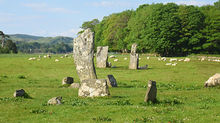Chasing the Northern Lights
- Imagine Alba
- Feb 2, 2022
- 3 min read
Updated: Oct 14, 2024
As summer fades and the longer nights of autumn set in, late September through early April is the best time of year to experience the Northern Lights, or aurora borealis. Oban’s latitude is northerly enough that, when the earth's weather and space weather align, we are able to capture, and sometimes view with the naked eye, this spectacular show.

The aurora borealis occurs when solar magnetic fields eject charged particles from the sun. If conditions are right, the electrons and protons flow along the Earth's magnetic field to the Polar Regions, where they interact with oxygen and nitrogen to produce a magical red, green and purple dancing light show in the night sky.
Every 11 years, the Sun goes through cycles shifting from periods of low activity (solar minimum) to periods of high activity (solar maximum). Currently, In 2024, we are nearing the solar maximum phase, resulting in an increase in the frequency and intensity of solar storms.
Auroras appear to the naked eye as a very faint, white glow in the sky to the magnetic north. Sometimes, though, we are lucky enough to catch the full show by eye as pillars of light beam up from the horizon and multi coloured ribbons dance across the sky. But many are invisible to the naked eye and the only way to see them is through a camera.
For the intrepid aurora hunter, here are some tips:
1. Get techy.
Northern light shows can happen anytime solar conditions are right, but having an app can help you predict when your chances are best. Our favourite app for predicting the lights is Glendale Aurora Alerts UK, run by Andy, who is based on Skye. The Facebook group Aurora Research Scotland is also very helpful.
2. Be prepared.
Have warm clothing and your camera equipment at the ready in case you receive an aurora alert so you can dash out the door in a hurry. Or, if conditions are favourable, go ahead and find a dark spot, set up your camera and have a thermos of coffee on hand.

3. Have the right equipment.
You don’t need a fancy camera to capture the lights, but a wide-angle lens allows you to get more of the sky in each shot. There are even apps for photographing the lights with your phone. A tripod is a must because the camera must remain still. If you don’t have a tripod, the bonnet of a car can work in a pinch.
4. Position yourself correctly.
Find a dark spot with a northern view and with a good view to the horizon. The lights usually do not appear very high in the sky, so if you are surrounding by hills or buildings, you may not have the best vantage. Some good viewing spots around Oban & Lorn include Ganavan Beach or along Ganavan Road towards Dunollie Castle, Dunstaffnage and McCaig’s Tower, and north of Oban, in Connel.
5. Use the right camera setting.
A good rule for a starting exposure is a manual setting of ISO 1600, 25 seconds shutter speed and the aperture set as wide as it can go (F2 – F4). Set the focus to infinity and the white balance to ‘auto’ and use a tripod if you have one. Set the lens to as wide an angle as you can go. On an Iphone, you can use the long exposure features in Night Mode. Touch the 'up' arrow in the top middle of the camera screen and then touch the moon icon (second from the left next to the flash icon.) This will allow you to set the exposure time, usually either 10 or 30 seconds. The phone must remain perfectly still while taking the photo.
6. Be patient.
Successful aurora hunters are prepared to wait all night if necessary to catch that elusive shot as they wait for conditions to peak and clouds to pass. Take lots of shots and view them on the computer, instead of just on the back of the camera, before you delete any.
Happy hunting!
Looking for things to do in Oban? Discover the best of Oban on a walking tour with our Scottish Tourist Guides Association certified and insured guide, Michelle. Explore Oban's highlights and hidden gems as you learn about its history, legend and natural environment, from cave people to clan chiefs to eccentric Victorians, as well as life in Oban today. Get in touch today about an Oban Walking Tour with Michelle!









































Comments